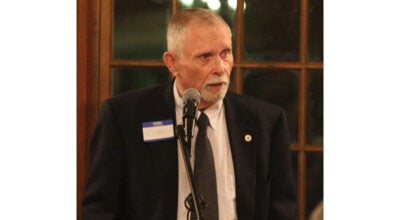As those with hope
Published 7:30 am Wednesday, November 11, 2020
|
Getting your Trinity Audio player ready...
|
By Charles Qualls
Somewhere in Georgia, there is a retired Marine my brother grew up with. He’s had a tough life, like many of our veterans. He’s struggled with mental health issues and with substances. He was homeless for a while. But lately, these last few years, the fog has lifted. Against all odds, he’s pulled it together.
He’s been learning to cook. He got a puppy that he’s raising and has managed to scrape together enough money to put a deposit down on a cabin in the mountains that he wants to move to. He has supportive friends who encourage him. He also just found out this weekend that he has cancer. It’s probably going to be terminal. He’s beginning to grieve, and a lot of other people around him are, too. Our God may not be cruel, but life sure can be.
All my life, I’ve heard athletes say that the one undefeated opponent they all face is time. One pastor I knew was oft quoted in reminding us that, “The mortality rate for human beings is hovering at right around 100 percent.” He’s right, much as we don’t like to admit it. In 1 Thessalonians 4:13-18, we hear “… so that you may not grieve as others do who have no hope.” That’s what the apostle Paul wished for the Thessalonians in today’s scripture. He had an important job to do here in this section of the letter.
At Thessalonica, Paul wrote to a church where too many of the Christians’ loved ones had died prematurely, likely due to persecution. This was one of the outposts where the pushback against Christianity had claimed its casualties. Now, they wanted to know what was next. To be clear, they wanted to know if their deceased loved ones would miss out on Christ’s glory as he returned. That was unique to their situation and time.
In some ways, though, their curiosities weren’t all that different from what ours can be sometimes. Paul didn’t tell them not to grieve, as some today will attempt to tell us. They do so trying to advocate a strong and unwavering faith. The apostle knew that grief was inevitable.
One conviction Paul had was not unlike some good advice we should follow in modern times, especially during a political election season. He challenged them to test what they heard before believing it. The Christians at Thessalonica were afraid their loved ones were simply dead. This was a common view in that time, that there was nothing at all after life.
There was this impression that perhaps Jesus Christ had already returned, and they and their loved ones had missed the Second Coming. Death for them appeared to be so final. So, the apostle Paul took the Thessalonian believers through some perspective of what he believed was still ahead in the way of eschatological happenings.
His aim was to assure them that this life, and death, wasn’t all there would be. We wrote to remind them that God’s bounty of goodness and hope hadn’t run out. It’s just that when you’re feeling so unstable, so unsure, it’s hard to see God at work. God is still creating and re-creating. That can be true for all of us, you and me. Our Lord is moving time forward and making things new.
When 2020 has wrung about all out of us that we think it can, Paul’s reassurance might be handy about right now. This year has given us the gift of a global pandemic that is just now swinging back around for a second run. There was a related and fairly predictable Recession that I heard would likely come with the pandemic. It did. 2020 has given us cultural unrest and the other things that life can throw at you and me that can hurt and challenge when none of the rest of this is even going on. Now a severe political division related to an election cycle has so many misbehaving and sniping at each other.
Paul wanted to remind the Thessalonians that there was more to life than what they could see at the moment. In their grieving, rather than telling them to stop grieving, he wanted them to be reminded of why they should also have hope. I want to remind you of the same today.
THE REV. DR. CHARLES QUALLS is pastor of Franklin Baptist Church. Contact him at 757-562-5135.





